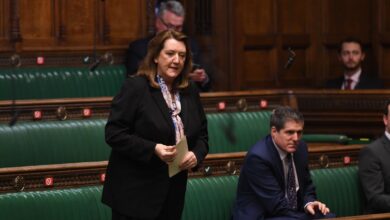Scotland cannot hold second independence referendum, Supreme Court rules

The Scottish parliament cannot hold a second referendum on independence without consent from Westminster, the Supreme Court has ruled in a fresh blow to Nicola Sturgeon’s hopes of holding a vote.
The UK’s highest court ruled that Holyrood cannot legislate on a vote, agreeing with the UK government that constitutional matters are reserved for the UK parliament.
The case was brought by SNP leader Ms Sturgeon, Scotland’s first minister, who had set out plans to hold a second ballot – dubbed indyref2 – on 19 October 2023.
But Supreme Court president Lord Reed said on Wednesday that judges unanimously agreed that the independence vote bill proposed by the SNP “does relate” to reserved matters.
“The Scottish parliament does not have the power to legislate for a referendum on Scottish independence,” he stated.
Ms Sturgeon has said she is “disappointed” by the ruling – but claimed the decision “makes [the] case” for independence.
“A law that doesn’t allow Scotland to choose our own future without Westminster consent exposes as myth any notion of the UK as a voluntary partnership,” she tweeted.
The SNP leader, set to make a full statment at 11.30am, added: “Scottish democracy will not be denied. Today’s ruling blocks one route … but in a democracy our voice cannot and will not be silenced.”
Despite the blow to her hopes, Ms Sturgeon is set to use the decision to try to drum up more support for independence, which lost narrowly to the “No” campaign in 2014.
The SNP leader previously warned that her party would run on the sole platform of independence at the next general election if the Supreme Court ruled against it.
Rishi Sunak has said now is not the time for “an unnecessary, divisive constitutional referendum” on Scottish independence.
The prime minister called the idea of holding indyref2 anytime soon as a “quite frankly barmy idea” during the Tory party’s August leadership contest.
Mr Sunak’s Scottish secretary Alister Jack said ministers “note and respect the unanimous ruling”, adding that people in Scotland want government to focus “on the issues that matter most to them”.
The verdict means the Scottish government’s top law officer, the Lord Advocate Dorothy Bain, will not now be able to clear a referendum bill for passage through the Scottish parliament.
During a hearing in October, Ms Bain had said resolving the legality of the proposed referendum bill was a “critically important question” which had been “festering” since the early days of devolution.
The UK government’s representative, Sir James Eadie, had argued the bill “squarely and directly” relates to a reserved matter. He also argued that the bill was at too early a stage for the court to even issue a ruling on.
But Lord Reed said the Supreme Court had decided that “it does have the power to decide” now on the question of whether a referendum could be held without Westminster consent.
Lord Reed said the court did not accept SNP arguments based on the “right to self-determination” in international law.
He said a Canadian case, which concerned Quebec, held that self-determination under international law only exists in situations “of former colonies, or where a people is oppressed … or where a definable group is denied meaningful access to government”.





